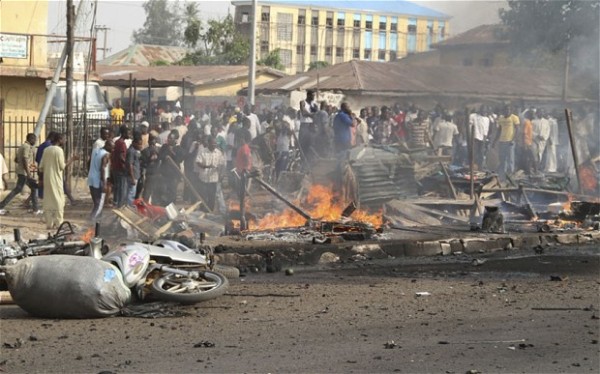Last Friday’s bomb blasts in Abuja that claimed no fewer than 20 lives and scores of injured people must be seen as the handiwork of the architects of terror. More significantly, the explosions represent the last kicks of a disorganised Boko Haram, a terror group that has been decimated by the superior firepower of the armed forces and security agencies. Ever since Boko Haram militants were dislodged by soldiers from their forest hideouts in the north, the members have been looking to regroup as they search for new places of abode.
Boko Haram is desperate. The terror group is approaching a breaking point. The more distressed the leaders become, the more suicidal and audacious their actions are likely to become. Sadly, while leaders of the evil organisation recruit, brainwash, and radicalise teenagers to carry out suicide bombings on the false assurance that they will receive their reward in heaven, the same leaders make conscious efforts to safeguard their own lives so they can continue to enjoy life to the maximum. That is the paradox of Boko Haram’s ideology and weird religious practices. They misinform and delude vulnerable youth in our society on the basis of a crank religious creed and false promises. Why can’t Boko Haram leaders make haste to take their own lives so they can quickly receive their so-called reward in heaven?
The leaders of Boko Haram are approaching their twilight. Some of the famished and distraught members are handing themselves in to security agents. Other members and their leaders are on the run as they try to evade capture by soldiers. They have tried every trick and failed. Suicide bombing has become the evil organisation’s preferred way of sending a message of fear.
Boko Haram is running out of options. Soldiers have smoked them out from their forest hiding places and now the terrorists have resorted to using teenage suicide bombers to create the impression they are not suffering casualties in the war front. It is all a smokescreen. The fact is that Boko Haram militants have been dislodged from their previous impenetrable Sambisa Forest hideouts. Now, they have dispersed across the northern states and are engaging in hit-and-run bomb explosions to create the impression they are still a formidable and organised terror group. That is no longer the case and the soldiers chasing them understand that sporadic bomb explosions are what civil society can expect from a terrorist organisation that has nowhere to hide, to regroup, or to strategize.
The public should expect more of these irregular bomb explosions until the remnants of the terror group have been rounded up or obliterated. The armed forces and state security agents need time, patience, and determination to see through this last phase of the campaign to drive away the terror group that used the northern states as the bastion of their evil operations and machinations.
In his official response to the Abuja bomb blasts, President Muhammadu Buhari described the blasts as “cowardly attacks”. He said the war between security forces and Boko Haram militants is not driven by ideology, no matter how quaint Boko Haram’s philosophy might be. Buhari said: “It is clear this battle is not ideological.
There are two or three implicit messages in Boko Haram’s continued use of suicide bombers to cause death, destruction, and fear. One, the organisation wants to convey the message that even in its disorganised state, even as the armed forces try to demolish the remaining ragtag members of the terror group, the insurgents still have the capacity and a pool of teenagers ready to strike Abuja and other strategic cities anytime and anywhere they choose. Two, Boko Haram believes that the continued death and destruction of civilian population could help to strike fear into the hearts of citizens and to show that it has the terrorists, the weapons, and the determination to continue to embarrass the armed forces and other security agencies.
One key concern about the bombings in Abuja and the most recent ones in Maiduguri is the impact they will have on the psyche of the people. There is, already, so much anger and disappointment among people in Abuja who feel that despite all the assurances given by security forces that the city would be guarded from any terror attacks. If Abuja had been protected, some people argue, the terrorists would not have managed to enter the city to detonate explosives strapped to their bodies.
While this is a valid point, the problem with fighting terrorism is that you can never be one hundred per cent certain that you have provided enough security to safeguard the lives of the people. Of course, it is important to be prepared and to do the best to minimise any attack.

